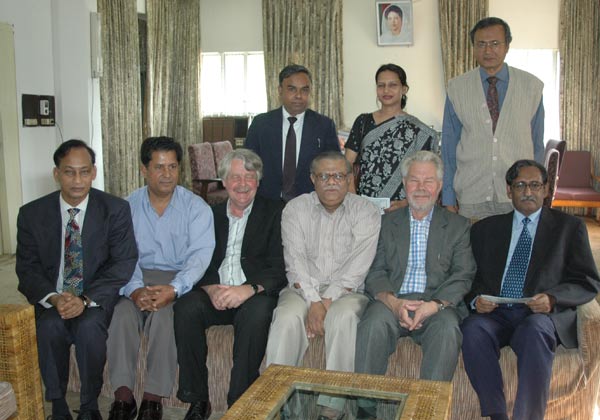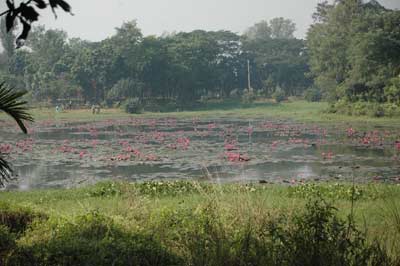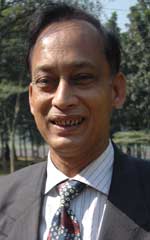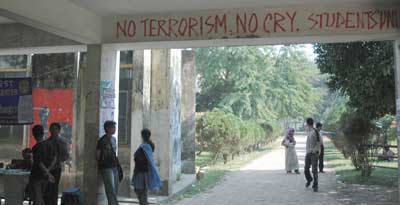SWEDISH SOUTH ASIAN STUDIES NETWORK
Report from visit to Jahangirnagar University, Savar, Monday 5 December 2005
Web page: http://www.juniv.edu/
 Founded
just on the eve of Independence in 1970, this is the only residential
university in Bangladesh. Like all other universities, it has all academic
levels from undergraduate to PhD, but the number of students is small,
only about 7 000, due to the limited capacity of the dormitory buildings.
There are also foreign students right now from Nepal, Iran and Pakistan.
Founded
just on the eve of Independence in 1970, this is the only residential
university in Bangladesh. Like all other universities, it has all academic
levels from undergraduate to PhD, but the number of students is small,
only about 7 000, due to the limited capacity of the dormitory buildings.
There are also foreign students right now from Nepal, Iran and Pakistan.
400 teachers/researchers do the teaching, of which 20 per cent are abroad to upgrade their academic level. There are four faculties (Arts, Social Sciences, Natural Sciences and Life Sciences) and 24 departments. Strangely enough Anthropology is a discipline here but not Sociology – in this land of relative ethnic homogeneity!
The periphery is starved of contacts and foreign collaborations, so when two Swedes arrived here to open some windows of opportunity, the Vice-Chancellor, Dr. Khandaker Mustahidur Rahman, took our visit seriously (compared to the mostly kind indifference to an almost unknown entity in the academic institutions in the capital). He had called the leaders of almost all the faculties for the meeting, and the meeting was also attended by the Pro-Vice Chancellor, Professor Md. Enamul Huq Khan, and the University treasure, Professor A.B.M. Enayet Hossain.
 The
first thing we learn is that Prof. Shaymol Kumar Roy, professor of Botany
has received a grant from the International
Science Programme, ISP, Uppsala University, to equip a laboratory,
which is much talked about. Are we following in the footsteps of Malin
Åkerblom, whom many in the science circles in Bangladesh seem to
know so well?
The
first thing we learn is that Prof. Shaymol Kumar Roy, professor of Botany
has received a grant from the International
Science Programme, ISP, Uppsala University, to equip a laboratory,
which is much talked about. Are we following in the footsteps of Malin
Åkerblom, whom many in the science circles in Bangladesh seem to
know so well?
The SASNET window of opportunity was carefully listened to, but since
it is a small offer from a small country, we sensed that most of the participants
considered it quite an abstract possibility to form real alliances.
As regards research profile in the University there is a great diversity
of individual research pursuits but some fields can be said to be more
prominent, like for example:
• Arsenic poisoning of well water, which is a research field for botanists, chemists and environmentalists
• The Botany department is working with developing a field gene bank for Bangladesh focusing on agricultural crops
We ended with a general discussion about various issues related to the
terrorism. All are scared about the prospects of increasing terrorism
in Bangladesh. It is both an international and a national issue.
One understanding goes like this, which most of those present agreed to:
After partition och liberation from Pakistan, Bangladesh society has developed
into a more and more divided land between rich and poor. It is the combination
of traditional Madrassa education and poor and marginalised students that
produces the fundamentalist cadre in this otherwise rather moderate Muslim
country. Moreover, in modern education there is a lack of teaching of
ethical issues, and the rift between modern and traditional education
exacerbates the rift. Thus, there is need for a cemented unity in Bangladesh.
The politicians lack the ability to fight poverty in a convincing way,
and if both elected government and military governments fail, the space
is opened for an Islamic government.
 We
were happy to meet Professor Golam
Hossain (photo to the left), Dept of Government and Politics,
who participated in the 18th European conference on Modern South Asian
Studies, organised by SASNET in Lund in July 2004. Prof Hossain was then
co-convenor of Panel No. 41 on ”The Political Economy of Bangladesh”
(more information on the panel).
Later he showed us around the beautiful campus area of Jahangirnagar university,
that even includes a lake full of migratory birds (see photo above).
We
were happy to meet Professor Golam
Hossain (photo to the left), Dept of Government and Politics,
who participated in the 18th European conference on Modern South Asian
Studies, organised by SASNET in Lund in July 2004. Prof Hossain was then
co-convenor of Panel No. 41 on ”The Political Economy of Bangladesh”
(more information on the panel).
Later he showed us around the beautiful campus area of Jahangirnagar university,
that even includes a lake full of migratory birds (see photo above).
 After
the main meeting in the Vice-Chancellor’s office we were also invited
for a brief visit to the Department of Government and Politics. Professor
Abul Kashem Mozumder and the other
political scientists present at the above meeting took us there. Prof.
Mozumder himself is interested in research on Public sector management.
After
the main meeting in the Vice-Chancellor’s office we were also invited
for a brief visit to the Department of Government and Politics. Professor
Abul Kashem Mozumder and the other
political scientists present at the above meeting took us there. Prof.
Mozumder himself is interested in research on Public sector management.
We were welcomed by Assistant Professor Naim
Sultan, chairman of the department, whose research interest is comparative
politics of South and Southeast Asia. He is a specialist on Indonesia.
Other researchers at the department being present were Assistant Professor
S.M. Tariqul Islam, Lecturer Tarana
Begum, Lecturer, and Ms. Tamalika
Sultana. Examples of studies carried out in the department are Corruption,
Islam and political development, Rights of women, and the relation between
Madrassa education and terrorism. The department has about 500 students
with a total staff of 16. The Department publishes an annual journal called
Asian Studies.
One of the assistant lecturers of the department, Bashir Ahmed, is currently studying in the Masters Programme in Asian Studies at Lund University. Bashir had in fact been instrumental in inviting us to visit Jahangirnagar University, and even though he was not present (he was still in Sweden at the time), we were after the meeting invited for lunch by his wife Ms. Shamima Sultana, Lecturer at the Dept. of Bangla Literature in their house.
SASNET - Swedish South Asian Studies Network/Lund
University
Address: Scheelevägen 15 D, SE-223 70 Lund, Sweden
Phone: +46 46 222 73 40
Webmaster: Lars Eklund
Last updated
2009-11-06
